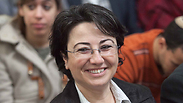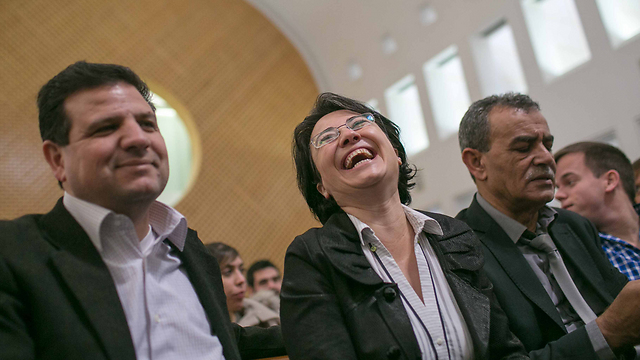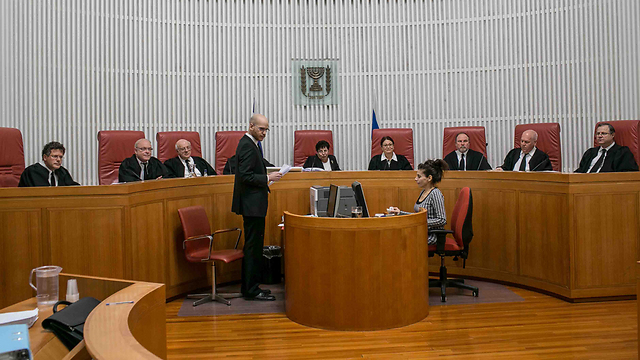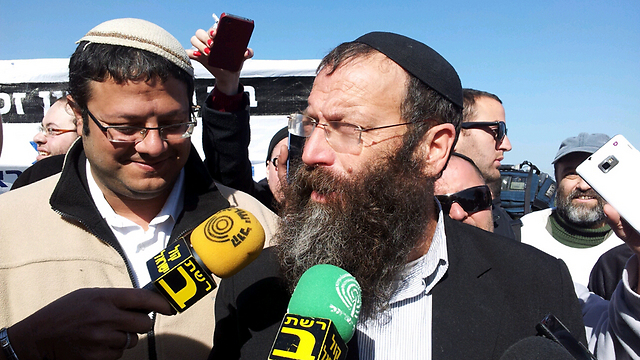
Zoabi might not be charged with incitement to violence
Balad MK was under police investigation for incident in which she allegedly insulted 2 policemen and incited to violence against them; Supreme Court hearing petitions from Zoabi, Marzel against disqualification.
Balad MK Hanin Zoabi might not be charged with incitement to violence if an arrangement reached between her legal team and the State Attorney's Office is approved by the court, her lawyer said Tuesday as the Supreme Court presided over a hearing on the firebrand legislator's appeal against a decision to ban her from running for Knesset.
"It is very likely that after talks between myself and the State Attorney, I'm assuming an indictment will be filed as part of the arrangement and the incitement to violence offense will not be included in the charges," Attorney Hassan Jabrin, who represents Zoabi, said. "The indictment will include only the insulting of a public servant, and therefore there is no incitement to violence."
In July 2014, a policeman from the Nazareth police station said he was accosted by Zoabi outside the Magistrate's Court in the city, where he arrived to testify against suspects of rioting. According to the policeman, Zoabi started swearing and hurling derogatory comments at him and another policeman who was with him, calling them "traitors" and saying they need to be exiled and "wiped the floor with."
He went on to say she turned to the dozens of people present at the scene in a way that raises the suspicion of insulting a public servant and incitement to violence.
Jabrin said Zoabi "explained that this wasn't her style, and admitted to have made a mistake. There were cases of other MKs in the past that, at the heat of their political activity, committed acts and were not indicted."
The court will rule on whether or not to accept the agreement on Wednesday.
Supreme Court hear appeal of Election C'tee ban
Zoabi was at the Supreme Court on Tuesday for a hearing on her appeal against the Central Election Committee's decision to ban her from participating in the March 17 elections. The committee also banned the firebrand Arab MK in 2003, but a Supreme Court ruling reversed the call, as will likely happen this time as well.The Supreme Court also held a hearing on an appeal by Yachad - HaAm Itanu candidate Baruch Marzel - who was also banned from running.
Supporters of both candidates also arrived at the court on Tuesday morning, with Border Police and the Court Guard were on hand to keep order and prevent confrontations.
Despite security presence, a clash broke out in the halls of the Supreme Court when Zoabi left the courtroom over a break in the proceedings. Several Yisrael Beytenu activists who arrived at the court to protest against Zoabi yelled "Terrorist" at her, adding that "Only Lieberman can take care of you," along with other remarks. Zoabi's supporters responded in kind, and the Court Guard had to separate the two camps.
As she arrived at the court, Zoabi said she was "certain the Supreme Court will overrule the decision, which was politically motivated. My fight for justice is moral and humane. I don't regret anything I said or did."
The Central Election Committee banned Zoabi with a majority of 27 votes, while 6 voted against it. Since this is a ban of an individual candidate rather than a party, the issue was automatically referred to the Supreme Court for approval.
The committee explained its decision to disqualify Zoabi: "Over the years of her membership in the Knesset, she has not stopped openly undermining the State of Israel and inciting against its government, institutions, IDF soldiers and commanders, and with her actions rejected Israel's existence as a Jewish and democratic state - a clause which allows to disqualify a Knesset candidate."
Regarding Marzel, the committee said he should be disqualified for his membership in the Kach movement, adding Marzel never took any public action to renounce the movement's way, and that he is inciting to racism. 17 supported the decision to bar his candidacy, while 16 objected.
The committee banned the two despite Attorney General Yehuda Weinstein's position against it, who explained he could not find satisfactory evidence in Marzel's past remarks that reject the State of Israel's core components as a democratic state or to consider these comments incitement to racism.
Regarding Zoabi, Weinstein determined that "even though in her case there is an accumulation of significant evidence that near the limit of what is prohibited, there aren't enough evidence to disqualify her."
During the appeal hearing, Jabrin argued that the decision to disqualify Zoabi, made with a large majority in the Central Election Committee much like the decision to disqualify her in 2013, was motivated by electoral reasons.
"Some of the voters (in the Central Election Committee) take into consideration the fact the Supreme Court will interfere, so they vote against Arab MKs. There's a consensus against Arab politics in Israel and it's a phenomenon that repeats itself.
"Requests to disqualify are being filed, claiming these candidates are terrorists or supporters of terrorism who intensively act against the state, but when they submit their response to the Supreme Court the picture changes," Jabrin said.
He noted Yisrael Beytenu's reasoning to disqualify Zoabi are based on four quotes and the incident in Nazareth, regarding which it was decided to indict Zoabi pending a hearing.
"They point to the Marmara as a case that proves an accumulation (of activity), but I'm saying it's quite the opposite. It was found that Zoabi was not involved in the violence and the Attorney General closed the case. When you look at the facts, the claims don't stand," he added.
Judge Hanan Meltzer asked Jabrin about Zoabi's trip to Qatar, citing that the law determines that a candidate that visited an enemy country will be considered one who supports an armed struggle. Jabrin responded that Qatar was not considered an enemy country, and that other Arab MKs actually went to Syria.
Supreme Court President Judge Miriam Naor asked Attorney Yoav Menny, who represents Yisrael Beytenu, how can he prove Zoabi supported terrorism. Menny said her controversial comments were enough.
The State Attorney's representative, Attorney Neta Oren, said the State Attorney objects to Zoabi's disqualification because disqualifying a candidate is a very extreme measure that should only be taken in cases in which there are no other democratic tools to address the issue, and that the evidence against the candidate must be clear and unequivocal. Oren said this is not the case with Zoabi. While there is an accumulation of disturbing remarks from Zoabi, they are not sufficient to disqualify her, she added.













